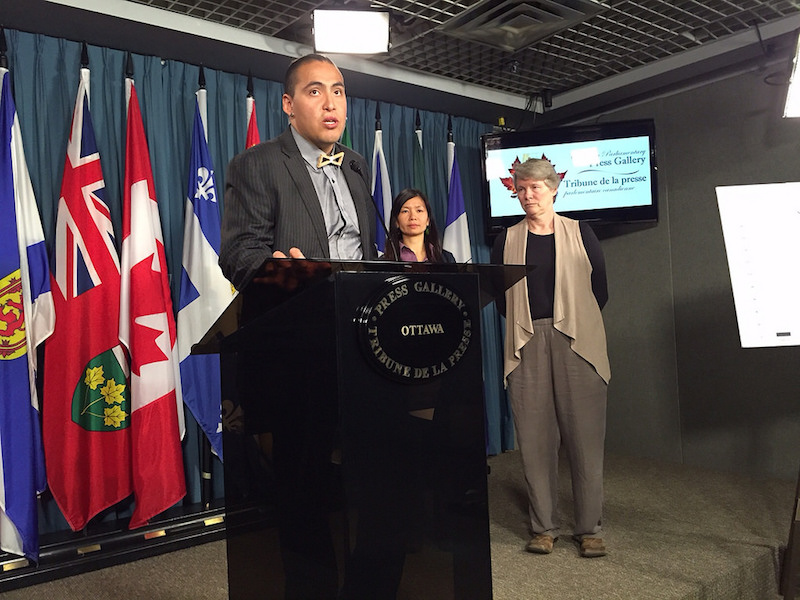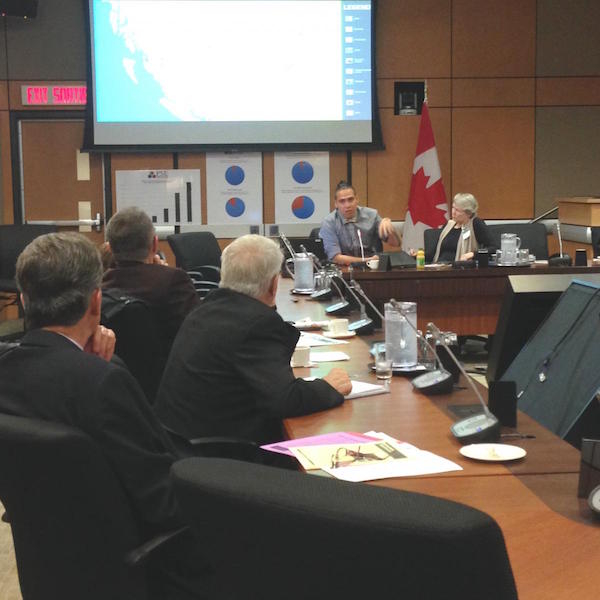Tuesday morning Indigenous lawyer Caleb Behn, pediatrician Dr. Kathleen Nolan and I presented to members of Parliament and senators urging meaningful action from the federal government on fracking.
At the breakfast briefing, I gave an overview on fracking across Canadian and Indigenous communities. Officials in attendance included NDP member of Parliament François Choquette, Liberal environment critic John Mackay, Green Party leader Elizabeth May, Senator Richard Neufeld, Senator Kelvin Ogilvie, Liberal water critic Francis Scarpaleggia and Senator Judith Seidman. Representations from the Assembly of First Nations also attended including Will David (Special Advisor – Implementing Rights), Irving LeBlanc (Special Advisor – Housing, Infrastructure and Emergency Issues Management Safe, Secure and Sustainable Communities) and Judy Whiteduck (Director of Economic Development).
Where are there moratoriums on fracking?
Communities have been raising a number of serious concerns about fracking including the risk of drinking water contamination. A recent study published shows that drinking water in Pennsylvania was contaminated by fracking. There are also risks to climate change, public health, ecosystems and wildlife. The potential for earthquakes and the lack of safe methods to dispose of fracking wastewater are other key threats associated with fracking.
There has been a wave of moratoria in Eastern Canada including in Quebec, New Brunswick, Nova Scotia and Newfoundland and Labrador. It has been heartening to see a number of provincial governments listening to communities and putting a stop to fracking because of the risks.
Despite the moratorium in both Nova Scotia and New Brunswick, there are proposals to have municipalities in these provinces treat existing fracking wastewater in their municipal wastewater facilities. The wastewater would then be discharged into the local river and all of which connect to the Bay of Fundy. Colchester County recently rejected a proposal for their town. Newfoundland and Labrador is currently going through an independent review panel process.
There has been a NAFTA lawsuit launched against the Canadian government by the company Lone Pine Resources for Quebec’s fracking moratorium. Trade agreements like NAFTA and CETA raise concerns because investor-state dispute settlement clauses can inhibit governments from implementing safety or environmental regulations.
While there is currently no horizontal, multi-stage fracking happening in Ontario, there are concerns industry wants to move forward with fracking which would put the Great Lakes at grave risk.
In Alberta, landowners have raised concerns about water contamination as well as health impacts on themselves and their livestock. Jessica Ernst is one example and the Supreme Court recently agreed to hear her case.
In British Columbia, there are up to 18 proposals to build Liquefied Natural Gas terminals along the Pacific Coast. Communities and First Nations are highlighting concerns about tanker safety and impacts on rivers and salmon.
Fracking recently started in the Northwest Territories. And now the Yukon government is opening its doors to fracking despite widespread opposition from Yukoners and First Nations. Maude Barlow, members of the Liard First Nation and I were recently in Whitehorse, Yukon to express opposition to fracking in the territory.
Fracking in northeastern B.C. and federal responsibility
Caleb Behn, a young lawyer from northeastern British Columbia, explained to members of Parliament and senators the scale of development in the northeast including the development of dams, pipelines, oil and gas and fracking projects.
Behn, who is also Eh Cho Dene and Dunne-Za from Treaty 8 Territory, talked about the impacts fracking has had on the land, water and wildlife. He showed shocking photos of lesions found in animals he has hunted not seen by past generations.

Photo by Caleb Behn
Behn emphasized the need for the federal government to step in and take responsibility under the national interest doctrine.
To learn more about Behn and his territory’s experience with fracking, see the recently released documentary called Fractured Land.
Health impacts on fracking and New York’s ban
Dr. Kathleen Nolan, a pediatrician with training in epidemiology, talked about the exponential increase in peer-reviewed research on the air quality, seismicity and health consequences.
Nolan, Senior Research Director for Catskill Mountainkeeper and co-founder of the Concerned Health Professionals of New York, described the children she has treated that have had seizures, chemical burns and other illnesses related to fracking. She talked about the clear link between these health impacts and fracking. Respiratory illnesses disappeared when they left their homes close to well sites and came back when they returned. The respiratory illnesses were manageable when they put in air filters in their homes.
She talked about the need for science to catch up with people’s stories. Nolan made recommendations in how to address the current impacts on fracking including the use of tracers and the need to legally require companies to disclose the names of fracking chemicals (without the concentrations).
Behn and Nolan speak at the press conference
CBC reported, “Indigenous lawyer Caleb Behn, pediatrician Dr. Kathleen Nolan and Council of Canadians national water campaigner Emma Lui hit the stage at the Centre Block press theatre to call on the government to “act now … to protect public health, our drinking water, and ecosystems from the impact of fracking” by imposing “adequate regulations” and ensuring federal oversight of the industry.”

In the press conference, Behn explained, “I am from northeastern B.C. We have some of the world’s biggest hydraulic fracturing operations in terms of volume of water used. Our people have been reporting anecdotally for quite a while about the issues associated with this development. It has become clear over time as the science catches up to people’s experience on the land adjacent to these developments that more has to be done.”
He warned, “We can’t race to the bottom line on energy and energy developments in this country without seriously considering the long term implications of these developments. There’s no technology on this planet that can reclaim a contaminated aquifer.”
DeSmog quoted Dr. Nolan, “People are getting sick…With water contamination there’s a lag time between the time the contaminants enter the water and then enters the person and then the person gets ill….it could take years or decades before the contaminants reach people.”
Watch the press conference and Q & A period.
The federal government and fracking
The Council of Canadian Academies’ report, commissioned by Environment Canada, looked into the state of knowledge on the potential environmental impacts of fracking and mitigation options.
The report found there were critical gaps in information including on well deterioration and leaks, chemical migration or contamination, cumulative impacts, hydrogeology, wastewater injection and the safety of fracking chemicals. The report showed that decision makers do know enough about fracking to declare it safe.
The Council of Canadians conducted a poll last fall that found 70 per cent of Canadians want a national moratorium on fracking until it is scientifically proven to be safe. However, while fracking still occurs communities need federal leadership in the areas of public health, climate, fisheries, drinking water and toxic chemicals.
It has been roughly five years since the then environment minister Jim Prentice said environmental regulations are still a work in progress for Canada’s booming shale gas industry and that environmental policies were being drawn up but impacted communities have not seen any concrete regulations that adequately address horizontal, multi-stage fracking.
What members of Parliament need to do
There are a number of areas where the federal government has responsibility to regulate fracking. Ministers, opposition critics and members of Parliament in impacted regions need to take concrete action in the following areas:
Fisheries Act: While the Fisheries Act has been gutted so that it now only prevents the depositing of deleterious substances that kills more than 50 per cent of fish at 100 per cent concentration over a 96 hour period, the Fisheries and Oceans Minister must still intervene in fracking wastewater disposal projects that impact waters frequented by fish. As mentioned, there are proposals in the Atlantic to treat fracking wastewater in municipal wasterwater systems.
Management of toxic chemicals: A memo to the Environment Minister in 2011 notes that under the Chemicals Management Plan (CMP), Environment Canada reviewed 265 chemicals used in the fracking process in both Quebec and the U.S. Only 13 of the 265 chemicals have been assessed under the Canadian Environmental Protection Act and only a quarter will be addressed under the CMP. Roughly half of the fracking chemicals did not meet the CMP criteria for further investigation, meaning these chemicals have not been assessed for potential risks to the public. Environment Minister Leona Aglukkaq and Health Minister Rona Ambrose must ensure that all chemicals commonly used in the fracking process must be assessed for public safety under the Chemicals Management Plan.
The UN Declaration on the Rights of Indigenous Peoples: The Council of Canadian Academies report noted that the majority of shale gas reserves are on Indigenous lands. The Canadian government has endorsed the UNDRIP and therefore must obtain free, prior and informed consent on fracking and related projects.
Human right to water: Canada has also endorsed the UN resolutions recognizing the human right to water and sanitation and therefore is required to come up with a national plan of action. There were 1,838 drinking water advisories at the end of January. The federal government, including all members of Parliament must commit to developing a national water policy that addresses current threats to water such as fracking.
As Behn said, “We can’t race to the bottom line on energy and energy developments in this country without seriously considering the long term implications of these developments. There’s no technology on this planet that can reclaim a contaminated aquifer.”
With the upcoming federal election, members of Parliament need to show real federal leadership and, along with federal election candidates, make genuine commitments to protect communities, public health, our climate and our water sources caused by fracking.
The Council of Canadians thanks Elizabeth May’s office for helping to organize the briefing on fracking for members of Parliament and senators as well as the press conference.



